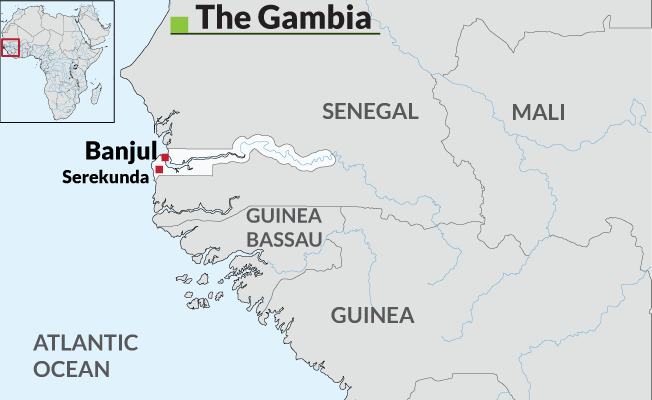Yahya Jammeh fires Gambia's ambassador to Senegal as tensions mount
Momodou Pa Njie second ambassador to be recalled after urging Jammeh to accept election defeat and step down.
Gambia's outgoing leader Yahya Jammeh has fired the Gambian ambassador to Senegal. The move comes as tensions are rife between the two countries, following Jammeh's decision to contest the result of presidential election held on 1 December.
Jammeh, who took power in a bloodless coup in 1994, lost in the 2016 election to Adama Barrow, head of a coalition of opposition parties and member of the United Democratic Party (UDP).
The incumbent leader initially conceded defeat, but now now intends to contest the vote at the Supreme Court due to what he says are "unacceptable abnormalities".
Momodou Pa Njie becomes the second ambassador to be recalled by Jammeh after he urged the leader to step down when his mandate expires on 19 January, the Jeune Afrique website reported.
On 19 December 2016, Jammeh recalled the ambassador to the US for the same reason.
Both diplomats were among some 11 ambassadors who issued a joint statement calling for Jammeh to respect the outcome of the election.
Jammeh's U-turn has sent shockwaves across the region, with growing tensions exacerbated by the chief of the army's decision to pledge loyalty to Jammeh instead of Barrow.
Earlier in December, four West African leaders – from Nigeria, Liberia, Sierra Leone and Ghana – met Jammeh and urged him to accept defeat. The leaders left without managing to secure a deal, with Jammeh vowing he would resist pressure to step down. Macky Sall, President of Senegal, which entirely engulfs Gambia, was not part of the delegation. The two countries have a history of poor relations.
Barrow told IBTimes UK he considered himself the "rightful leader" of the country and was confident the issue could be resolved peacefully.
However, the head of Economic Community Of West African States (Ecowas) has claimed that a military intervention to remove Jammeh was "possible" and that "stand-by forces" – likely led by Senegal – were on alert and would be deployed "to restore the people's wish".
One week before Barrow's scheduled swearing-in ceremony, Alieu Momar Njai – Gambia's Independent Electoral Commission (IEC) chief who announced Yahya Jammeh's defeat – has gone into hiding.
Latest reports have now claimed Jammeh "has begun recruiting mercenaries" with ties to other West African governments.
Jammeh's U-turn followed an admission by the IEC that it had erred during vote counting, and Barrow's margin of victory had narrowed from 9% to 4%.
Despite the changes, the commission insists that the new tally leaves the outcome of the election unchanged with Barrow receiving 43.3% of the vote, and Jammeh 39.6%.
The country's High Court has adjourned the case until 10 January.

Gambia
Gambia is a West African nation surrounded by Senegal, a former French colony. Gambia is an Islamic republic that gained independence from Great Britain in 1965.
In 1970, the country became a republic within the Commonwealth, but it withdrew from the organisation in 2013.
- Capital Banjul
- Population 1.8m (2013 census)
- Outgoing President Yahya Jammeh - due to step down on 19 January 2017
- President elect Adama Barrow
- Official languages English
- National languages Mandinka, Fula, Wolof, Serer, Jola
- Main ethnic groups Mandinka (42%) , Fula (19%), Wolof (15%), Jola (10%) Serahuli (8%), Serer (2.5%)
- Religions Islam (90%), Christinaity (8%), indigenous beliefs (2%)
© Copyright IBTimes 2025. All rights reserved.






















